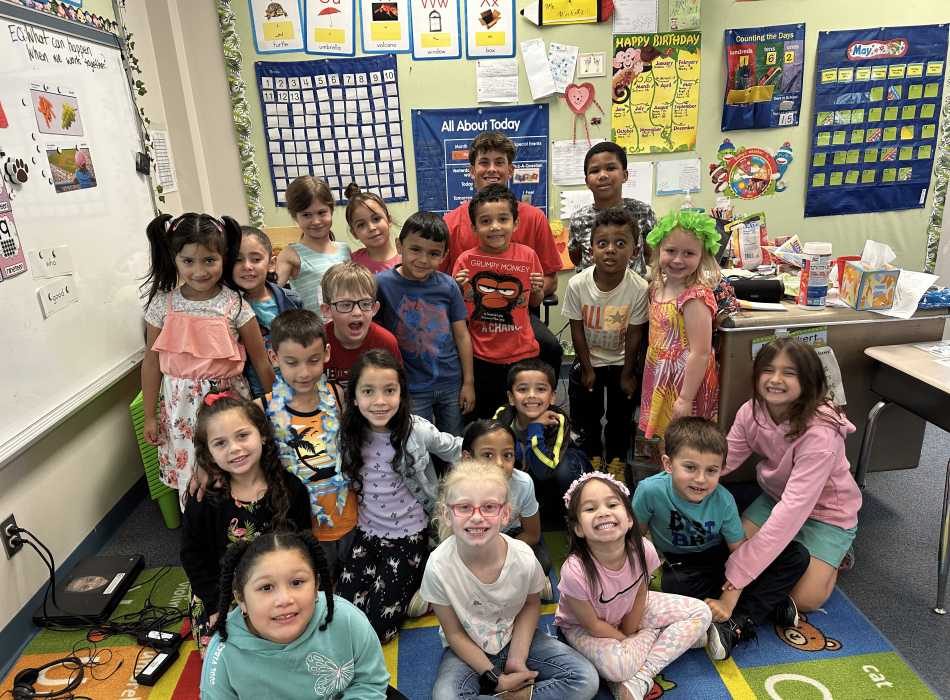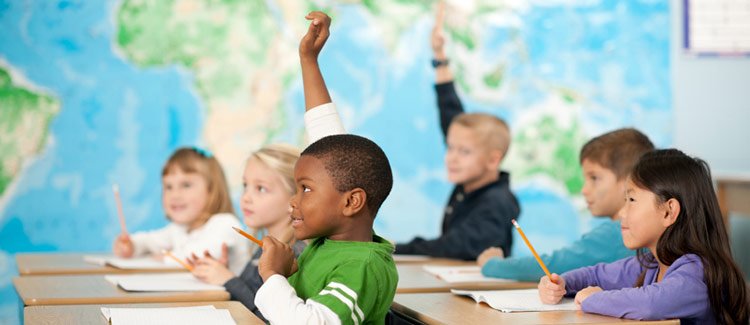Imaginative Knowing Activities in Preschool: Enhancing Abilities Via Play and Communication
Imaginative understanding activities in preschool function as foundational experiences for young learners (Grade School Peoria). These activities encourage skill advancement through lively involvement and social interaction. Youngsters explore their creative thinking, boost communication, and discover important social skills. Each experience adds to their development in distinct ways. Comprehending exactly how these activities shape early development discloses the profound influence of play in education. What details aspects make these experiences so efficient in supporting all-round individuals?
The Function of Play in Early Childhood Growth
While lots of might underestimate the relevance of play, it works as an essential element of very early childhood years advancement. With play, children explore their settings, foster social skills, and develop cognitive abilities. Participating in disorganized activities allows them to utilize their imagination, experiment with problem-solving, and improve their critical reasoning abilities. Moreover, play supplies a risk-free space for psychological expression, enabling kids to browse their feelings and build strength.
Furthermore, play encourages physical growth as youngsters engage in activities that improve their electric motor skills and control. Communication with peers during play promotes teamwork and communication, preparing for future relationships. Kindergarten. Educators and parents recognize that play is not merely an activity however an important facet of understanding, forming a youngster's ability to adapt and thrive in different circumstances. Eventually, play improves children's lives, preparing them for the obstacles of the future while promoting a long-lasting love for understanding
Innovative Arts and Crafts: Stimulating Creativity
Imaginative arts and crafts play a considerable role in igniting youngsters's creative imaginations and enhancing their innovative abilities. These tasks urge self-expression via different tools, such as painting, attracting, and sculpting. By engaging in hands-on jobs, kids find out to adjust products, fostering great motor skills and hand-eye sychronisation.
Imaginative arts provide a system for problem-solving and vital thinking, as children discover different strategies and methods to their creations. This exploration enables them to experiment, make decisions, and pick up from their experiences.
Partnership is an additional vital aspect, as children frequently interact on team tasks, sharing ideas and resources. This interaction not only builds social skills yet also nurtures a feeling of community. Inevitably, creative arts and crafts offer as crucial devices in a kindergarten setup, advertising cognitive, emotional, and social growth while stimulating the natural interest and creative imagination of young learners.
Interactive Narration: Building Language Abilities
Interactive narration acts as a powerful tool for building language abilities in little ones, as it involves them in the narrative process and motivates active participation. With storytelling sessions, kids are invited to pay attention, respond, and also add to the unraveling tale. This interactive style nurtures vocabulary advancement by exposing them to brand-new words in context.
As they get involved, youngsters exercise vital interaction skills, such as articulation and expression. They learn to series events, identify personalities, and understand the story, promoting vital reasoning. In addition, interactive narration often includes visual aids, sound results, and props, which even more other improve interaction and understanding.
In addition, when children share their very own stories, they experience a sense of firm and imagination, reinforcing their language abilities in a supportive environment. Ultimately, interactive storytelling grows a love for language and literature, setting a solid structure for their future academic success.
Hands-On Science Experiments: Encouraging Query
Hands-on science experiments give young learners with invaluable possibilities to discover and make inquiries about the globe around them. Participating in easy, interactive experiments allows kindergarteners to ask concerns, make forecasts, and observe outcomes firsthand. These activities promote curiosity and cultivate a sense of wonder, encouraging children to explore the buildings of materials, responses, and all-natural phenomena.
Experiments such as planting seeds or blending baking soft drink and vinegar not just highlight clinical ideas however additionally improve critical thinking skills. Youngsters discover to record their observations, advertising proficiency and numeracy as they gauge, compare, and document data. Additionally, hands-on science promotes a growth way of thinking, mentor durability as they browse challenges and pick up from blunders.

Collaborative Games: Fostering Team Effort and Social Skills
Engaging in collective games offers kindergarteners an unique system to develop teamwork and social skills while constructing on the inquiry-based discovering cultivated by hands-on scientific research experiments (Kindergarten). These video games motivate youngsters to function with each other towards common goals, advertising interaction and collaboration. As they navigate different difficulties, they learn to share obligations, bargain duties, and solve problems-- important elements of efficient teamwork
With structured activities such as group problems, relay races, or cooperative storytelling, children not only enhance their social interactions yet likewise enhance their psychological knowledge. They obtain understandings right into empathy and support, learning that each child's contribution is valuable. In addition, these collaborative experiences cultivate a sense of neighborhood within the class, creating bonds that extend past specific play. By integrating collaborative video games right into the curriculum, educators can prepare for important life skills that will certainly benefit kids in their future educational and social settings.
Regularly Asked Inquiries
Exactly How Can Moms And Dads Assistance Creative Knowing in the house?
Parents find more can support imaginative learning in your home by providing varied products, encouraging exploration, participating in imaginative play, asking flexible concerns, and cultivating a safe setting where kids really feel totally free to reveal their concepts and imagination.

What Products Are Finest for Arts and Crafts Activities?
A variety of materials improve arts and crafts tasks, consisting of building and construction paper, scissors, adhesive, markers, paints, and recycled items. These sources motivate creativity and permit youngsters to explore their creativity via hands-on experiences.
Just How Do Educators Assess Kid's Creative thinking?
Teachers evaluate children's creative thinking through observations, portfolios of work, and open-ended projects that motivate self-expression. They evaluate problem-solving skills, creativity, and readiness to experiment, providing insights right into each child's special imaginative advancement and capabilities.
What Are Some Examples of Outdoor Creative Activities?

Exactly How Can Cultural Styles Be Integrated Into Creative Understanding?
Cultural themes can be integrated right into creative discovering by integrating varied tales, music, art, and traditions, motivating youngsters to discover and celebrate numerous backgrounds, fostering inclusivity and understanding while boosting their imagination and cognitive abilities.
Children discover their creativity, enhance communication, and find out important social abilities. Via play, children explore their environments, foster social abilities, and develop cognitive capabilities. Additionally, play urges physical development as kids engage in tasks that enhance their motor abilities and coordination. Imaginative arts and crafts play a substantial role in firing up kids's imaginations and improving their imaginative abilities. wikipedia reference Interactive storytelling offers as a powerful tool for developing language abilities in young children, as it engages them in the narrative procedure and urges active engagement.